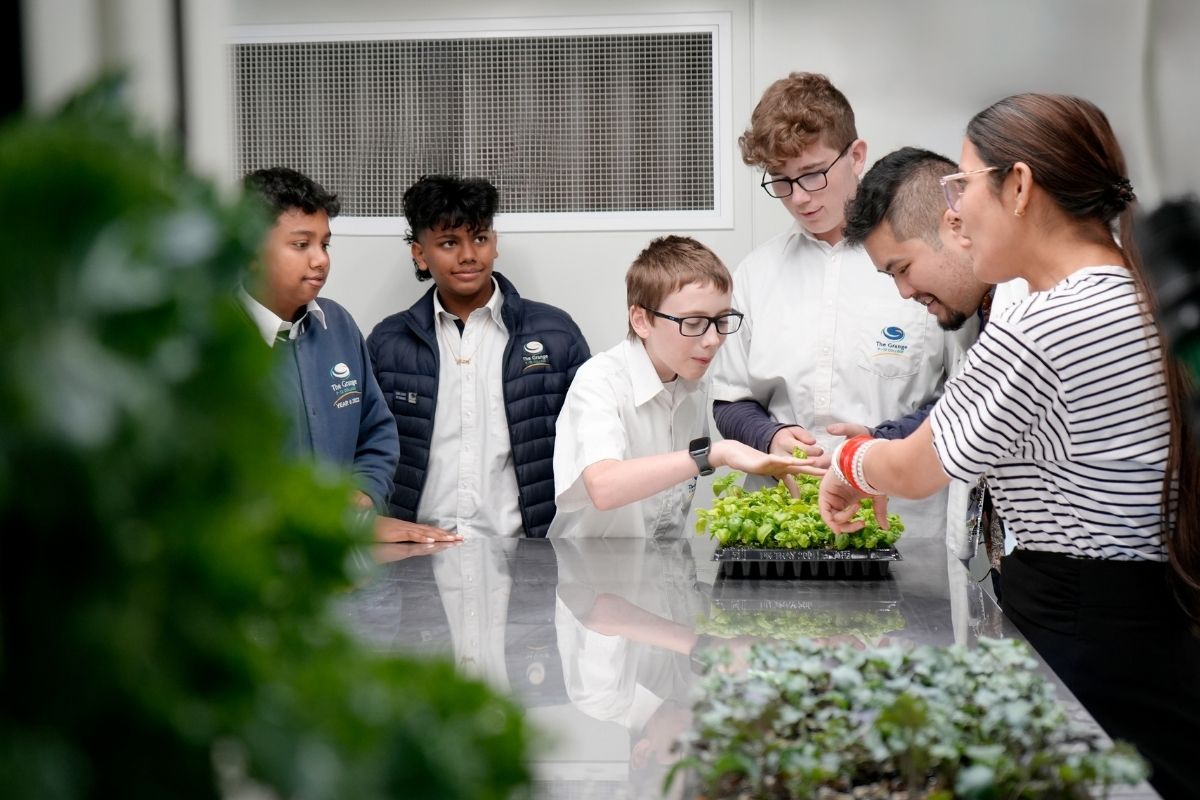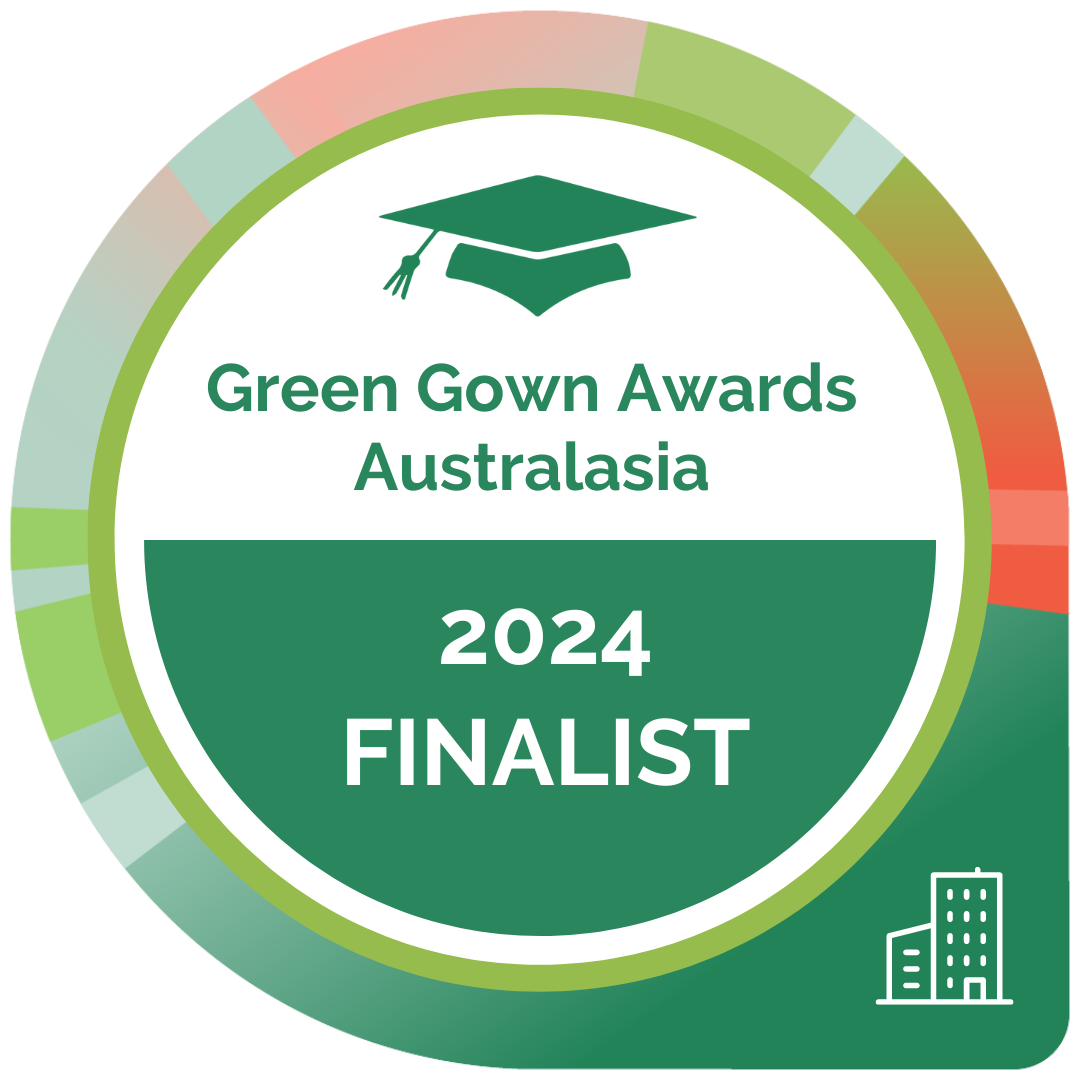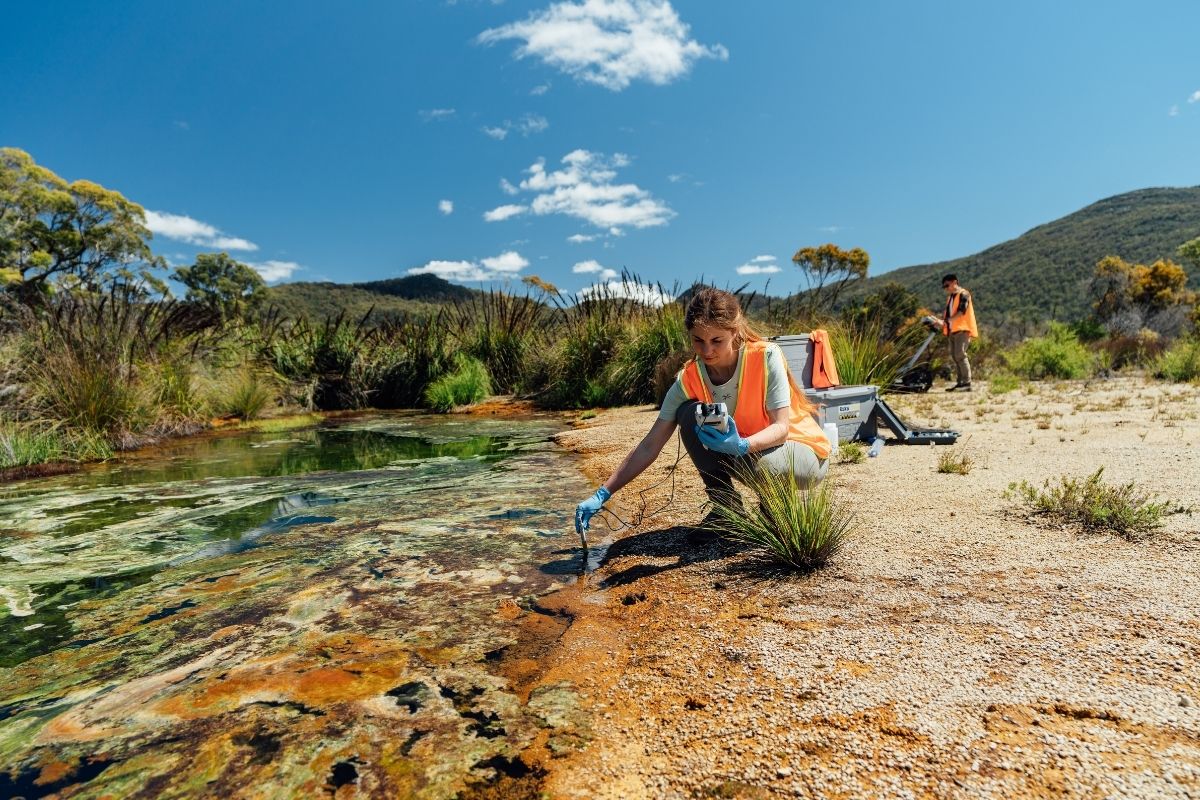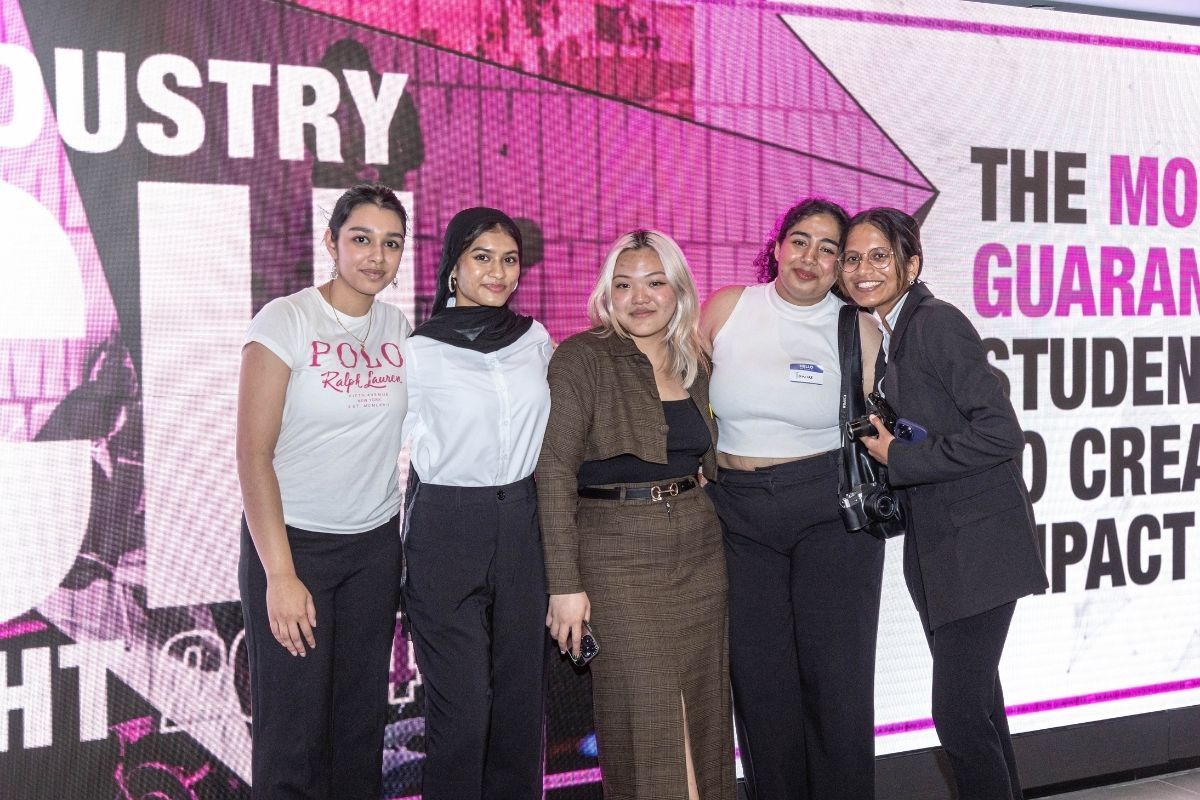Next Generation Learning & Skills category
Victoria University’s “The Smart Farm @ Wyndham Tech School” is an innovative educational project that integrates cutting-edge technology with sustainable agriculture to provide hands-on learning experiences for secondary students in Melbourne’s western suburbs. The initiative is centered around a 40ft shipping container converted into a high-tech vertical farm, equipped with an Internet of Things (IoT)-controlled environment. The project aims to engage students in exploring sustainable farming practices while introducing them to the technological, scientific, and business aspects of modern agriculture. Since its inception, the Smart Farm has engaged over 1,600 students and 40 secondary school teachers, far exceeding initial engagement goals.

Environmental and Social Benefits
- Resource Efficiency: The Smart Farm significantly reduces water and energy usage compared to traditional farming methods. The IoT-controlled environment optimises resource management, demonstrating sustainable agriculture practices that can be replicated in urban settings.
- Sustainable Practices: The farm is powered by solar energy and utilises a closed-loop water recycling system, minimising its ecological footprint. These sustainable practices are integral to the farm’s operations and serve as a model for environmentally friendly agriculture.
- Community Engagement: The project has fostered strong community ties by involving local industries, Indigenous groups, and educational institutions. This engagement promotes a deeper understanding of local agricultural heritage and sustainability practices.
Leadership and Engagement
- Collaborative Partnerships: The project is supported by a $368,000 grant from the Victorian Government’s Secondary Schools Agriculture Fund and has partnered with industry leaders such as Velisha Farms and Modular Farms Australia. These partnerships enhance the educational content with real-world insights into agribusiness and technological applications.
- Student-Centered Learning: The initiative provides students with hands-on experiences in sustainable agriculture, integrating practical applications of IoT technology, plant science, and business strategies. The Smart Farm allows students to develop skills that are directly applicable to future careers in the rapidly evolving agritech sector.
- Staff and Community Involvement: The project has engaged the entire Wyndham Tech School staff, who have received specialised training to operate the farm, and has also involved over 300 industry experts in tours and educational activities, demonstrating broad community support and involvement.
Significance to the Sector
- Innovative Educational Model: The Smart Farm’s integration of IoT technology with sustainable agricultural practices offers a unique educational model that can be replicated across other schools and institutions. Its focus on real-world applications and cross-curricular learning sets a new standard for STEM education.
- Scalable Impact: The project’s success in engaging a large number of students and educators in a relatively short time highlights its potential for expansion. Plans to incorporate agritech and agribusiness into vocational training programs demonstrate the initiative’s scalability and relevance to broader educational and industry contexts.
- Sector Leadership: By bridging the gap between technology and agriculture, the Smart Farm positions Victoria University as a leader in innovative educational practices. The project’s success in integrating sustainability into the curriculum serves as a model for other institutions seeking to advance sustainability education.
Wider Societal Impact
- Economic and Social Contributions: The Smart Farm supports local economic development by collaborating with local agricultural businesses and creating a network of industry partners. These collaborations not only enhance the educational experience but also contribute to the local economy and foster sustainable business practices.
- Cultural Integration: The project incorporates Indigenous knowledge and practices through partnerships with local Indigenous nurseries, promoting the use of modern farming techniques to support native revegetation efforts. This integration enriches the educational content and fosters respect for cultural heritage.
- Global Relevance: The Smart Farm’s innovative approach to sustainable agriculture and education has the potential to influence similar projects globally, particularly in urban settings where resource efficiency and sustainable practices are increasingly critical.
Victoria University’s “The Smart Farm @ Wyndham Tech School” is an initiative that successfully combines advanced technology with sustainable agriculture to provide students with practical, hands-on learning experiences. The project not only enhances educational outcomes but also promotes sustainability and community engagement, making it a model for other institutions. Its innovative approach, strong community ties, and potential for scalability underscore its significance within the education sector and beyond, positioning it as a leader in next-generation learning and skills development.
Top 3 learnings
Supported by

Category finalists
Next Generation Learning & Skills/Winners
Next Generation Learning & Skills/Winners
Next Generation Learning & Skills
Next Generation Learning & Skills
Next Generation Learning & Skills
Next Generation Learning & Skills
Past winners
Benefitting Society/Winners
Benefitting Society/Winners
Diversity, Equity & Inclusion in Sustainability/Winners
Diversity, Equity & Inclusion in Sustainability/Winners
Climate Action/Winners
Climate Action/Winners
Sustainability Institution of the Year/Winners
Sustainability Institution of the Year/Winners
Creating Impact/Winners
Creating Impact/Winners
Creating Impact/Winners
Creating Impact/Winners
Top 3 learnings
Next Generation Learning & Skills category
Victoria University’s “The Smart Farm @ Wyndham Tech School” is an innovative educational project that integrates cutting-edge technology with sustainable agriculture to provide hands-on learning experiences for secondary students in Melbourne’s western suburbs. The initiative is centered around a 40ft shipping container converted into a high-tech vertical farm, equipped with an Internet of Things (IoT)-controlled environment. The project aims to engage students in exploring sustainable farming practices while introducing them to the technological, scientific, and business aspects of modern agriculture. Since its inception, the Smart Farm has engaged over 1,600 students and 40 secondary school teachers, far exceeding initial engagement goals.

Environmental and Social Benefits
- Resource Efficiency: The Smart Farm significantly reduces water and energy usage compared to traditional farming methods. The IoT-controlled environment optimises resource management, demonstrating sustainable agriculture practices that can be replicated in urban settings.
- Sustainable Practices: The farm is powered by solar energy and utilises a closed-loop water recycling system, minimising its ecological footprint. These sustainable practices are integral to the farm’s operations and serve as a model for environmentally friendly agriculture.
- Community Engagement: The project has fostered strong community ties by involving local industries, Indigenous groups, and educational institutions. This engagement promotes a deeper understanding of local agricultural heritage and sustainability practices.
Leadership and Engagement
- Collaborative Partnerships: The project is supported by a $368,000 grant from the Victorian Government’s Secondary Schools Agriculture Fund and has partnered with industry leaders such as Velisha Farms and Modular Farms Australia. These partnerships enhance the educational content with real-world insights into agribusiness and technological applications.
- Student-Centered Learning: The initiative provides students with hands-on experiences in sustainable agriculture, integrating practical applications of IoT technology, plant science, and business strategies. The Smart Farm allows students to develop skills that are directly applicable to future careers in the rapidly evolving agritech sector.
- Staff and Community Involvement: The project has engaged the entire Wyndham Tech School staff, who have received specialised training to operate the farm, and has also involved over 300 industry experts in tours and educational activities, demonstrating broad community support and involvement.
Significance to the Sector
- Innovative Educational Model: The Smart Farm’s integration of IoT technology with sustainable agricultural practices offers a unique educational model that can be replicated across other schools and institutions. Its focus on real-world applications and cross-curricular learning sets a new standard for STEM education.
- Scalable Impact: The project’s success in engaging a large number of students and educators in a relatively short time highlights its potential for expansion. Plans to incorporate agritech and agribusiness into vocational training programs demonstrate the initiative’s scalability and relevance to broader educational and industry contexts.
- Sector Leadership: By bridging the gap between technology and agriculture, the Smart Farm positions Victoria University as a leader in innovative educational practices. The project’s success in integrating sustainability into the curriculum serves as a model for other institutions seeking to advance sustainability education.
Wider Societal Impact
- Economic and Social Contributions: The Smart Farm supports local economic development by collaborating with local agricultural businesses and creating a network of industry partners. These collaborations not only enhance the educational experience but also contribute to the local economy and foster sustainable business practices.
- Cultural Integration: The project incorporates Indigenous knowledge and practices through partnerships with local Indigenous nurseries, promoting the use of modern farming techniques to support native revegetation efforts. This integration enriches the educational content and fosters respect for cultural heritage.
- Global Relevance: The Smart Farm’s innovative approach to sustainable agriculture and education has the potential to influence similar projects globally, particularly in urban settings where resource efficiency and sustainable practices are increasingly critical.
Victoria University’s “The Smart Farm @ Wyndham Tech School” is an initiative that successfully combines advanced technology with sustainable agriculture to provide students with practical, hands-on learning experiences. The project not only enhances educational outcomes but also promotes sustainability and community engagement, making it a model for other institutions. Its innovative approach, strong community ties, and potential for scalability underscore its significance within the education sector and beyond, positioning it as a leader in next-generation learning and skills development.
Supported by

Related finalists
Next Generation Learning & Skills/Winners
Next Generation Learning & Skills/Winners
Next Generation Learning & Skills
Next Generation Learning & Skills
Next Generation Learning & Skills
Next Generation Learning & Skills
Other finalists
Climate Action

Driving Towards Tomorrow’s Campus with Vehicle-to-Grid EV Technology
As part of Flinders University’s drive to innovate and become a leader in climate action, the University launched its Vehicle-to-Grid (V2G) initiative. This involved installing and maintaining 20x V2G and smart chargers for its growing electric vehicle fleet. Leveraging 100% renewable energy generated by ENGIE’s Willogoleche Wind Farm and Flinders University’s solar power systems, this enables the storage of renewable energy in EV batteries to be discharged on campus during peak demand periods. Hence, allows for these EV fleets to operate as a Virtual Power Plant (VPP) to deliver peak demand management and optimization of behind-the-meter generation.
Overall, this initiative demonstrates the reliability and scalability of bi-directional and uni-directional smart-charging systems for EVs in reducing GHG emissions while facilitating teaching, research, and innovation opportunities. Moreover, it exemplifies a sustainable and innovative solution to scale energy storage technology and increase renewables.
Sustainability Champion – Staff/Winners

Brandan Espe
Environmental Officer / Acting Grounds Supervisor
Brandan has brought over 50 federally listed Endangered species of plant into the James Cook University living collection, many of which have never been cultivated and are found in no other collection in the world.
Of these, over half have been sustainably wild collected, inclusive of field and clone data, so they can be used for ongoing conservation, research and teaching, the remaining being sourced from private and partner organisations through favours of service or trades.
He personally funded the project from 2019-2022, until funding was awarded for the program due to its success, with the program now being engrained into the Universities landscapes for ongoing management should he leave JCU, creating a threatened species legacy collection.
The program has now expanded beyond this, with an additional 48 species now funded for further addition, some of which are only known from less than 5 sightings in history.
Student Engagement

Sustainability Leaders creating real impact!
La Trobe created a unique Sustainability Leaders volunteering program to increase engagement with students on campus and empower them to act against waste and promote sustainability. It included the following initiatives:
- Promoting the reusable crockery implementation,
- Increasing knowledge action of other students on campus to diversion comingled recycling and organic waste from landfill.
- Focus on waste audits and data,
- Improved signage through new waste posters for students living on campus.
- Collaboration with Cirka (our cleaning and waste partner) to create a waste wall and;
- Learning all things sustainability (net zero, biodiversity, waste, reusables, engagement)
These initiatives yielded significant results and with a reduction in waste contamination by almost 40% at the residential buildings and engagement with over 80 groups of people for the Reusable Revolution.
Creating Impact

Where knowledge meets habits: Empowering students for a sustainable tomorrow
Our online Sustainability Challenges offer participants an engaging, self-paced learning experience centered around a specific United Nations Sustainable Development Goal (UNSDG). Requiring minimal resourcing and at zero-cost to participants, we’ve created replicable, compact, scalable, and impactful learning opportunities that result in real impact.
The Challenges follow a structured process that moves participants from knowledge gain to simple action to celebration, to establish small but mighty habits relating to waste and carbon emissions. This approach recognises that knowledge alone is often insufficient to drive behaviour change, and that ease of action and celebration are crucial components in creating sustainable habits.
Sustainability Champion – Staff/Winners

Catherine (CeeJay) Donovan
Veterinary nurse – Anaesthesia
From establishing the Massey Vet School Green Team to leading impactful initiatives, my commitment to environmental sustainability has been making waves. With the help of my team, I have accomplished numerous small, yet meaningful actions, including integrating a sustainability lecture for final year vet students and implementing battery recycling alongside rechargeable battery use. Our larger projects encompass the introduction of green waste and soft plastics recycling bins, an energy audit resulting in power-saving measures, and playing a part in a successful rubbish audit. I spearheaded the ‘6 in 6’ campaign, empowering individuals with six simple steps for workplace sustainability. Through the SustainaVet social media pages I help to educate and inspire peers nationwide. As the Massey School of Veterinary Science sustainability champion, I had the privilege of speaking at the annual veterinary conference on sustainability in clinical practice. Currently I’m conducting pioneering research on responsible cat waste disposal. Together, we’re forging a greener future, one initiative at a time.
Sustainability Champion – Student

Louis Walmsley
SDG Coordinator Monash Association of Sustainability, Office Bearer Monash Student Association’s Environmental and Social Justice Department, Masters of Environment and Sustainability Student
Louis is an exceptional student sustainability leader at Monash University. His passion and dedication to sustainability have made a significant impact on the community. Louis’s values revolve around sustainability, which is evident upon meeting him. He actively participates in various sustainability groups, demonstrating his commitment to creating a more environmentally conscious society.
One of Louis’s notable involvements is with Precious Plastic Monash, where he organizes remarkable events and fosters collaboration among like-minded individuals, student groups, and staff. His contributions to the Monash Association of Sustainability have allowed him to conduct valuable research on plastic usage and climate action, resulting in positive changes within the university.
Through his work with the Monash Student Association, Louis has engaged hundreds of students in fun and interactive sustainability initiatives. He took the initiative to organize a sustainability food fair, which was one of the largest sustainability-related events held at Monash post-COVID. This accomplishment is a true testament to Louis’s hard work and creativity.
Louis is an outstanding student leader whose efforts in sustainability have had a lasting impact on Monash University and its community. His inspiring nature resonates with everyone who knows him.














